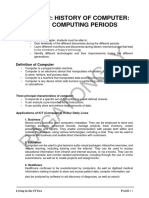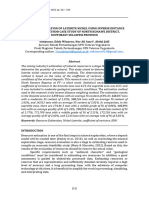0% found this document useful (0 votes)
20 views4 pagesComputers Importance Modern Days
Computers have become integral to modern life, impacting education, communication, business, healthcare, science, entertainment, and governance. They facilitate global connectivity and efficiency but also present challenges such as cybersecurity threats and the digital divide. The future of computing promises advancements in AI, IoT, and sustainable practices, further shaping human progress.
Uploaded by
desertm879Copyright
© © All Rights Reserved
We take content rights seriously. If you suspect this is your content, claim it here.
Available Formats
Download as PDF, TXT or read online on Scribd
0% found this document useful (0 votes)
20 views4 pagesComputers Importance Modern Days
Computers have become integral to modern life, impacting education, communication, business, healthcare, science, entertainment, and governance. They facilitate global connectivity and efficiency but also present challenges such as cybersecurity threats and the digital divide. The future of computing promises advancements in AI, IoT, and sustainable practices, further shaping human progress.
Uploaded by
desertm879Copyright
© © All Rights Reserved
We take content rights seriously. If you suspect this is your content, claim it here.
Available Formats
Download as PDF, TXT or read online on Scribd
/ 4






















































































